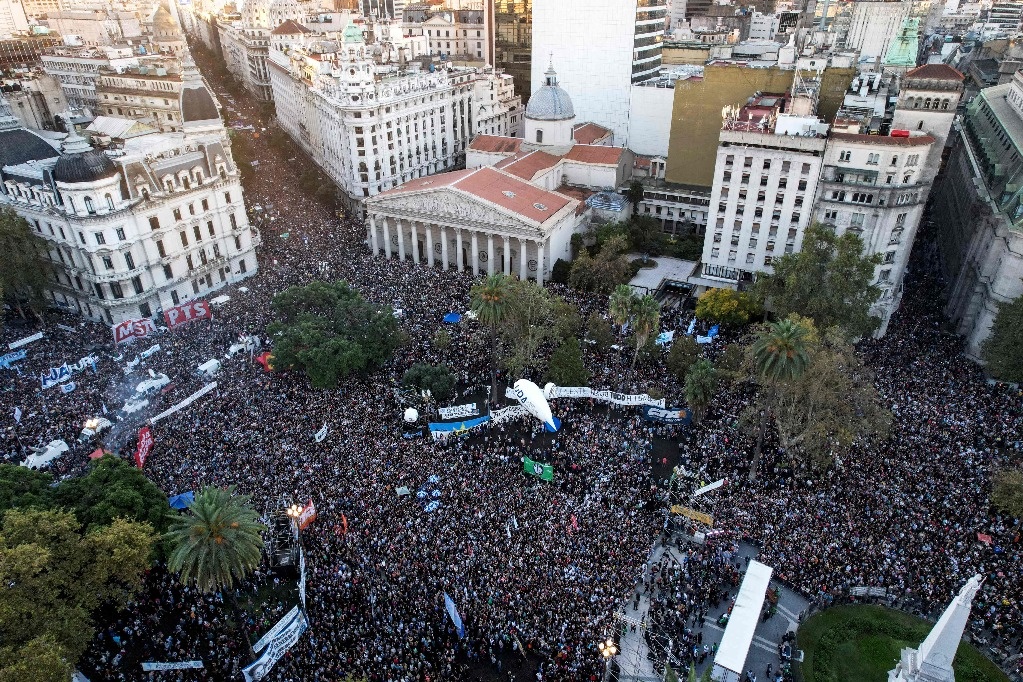Buenos Aires. Argentine President Javier Milei denied on Wednesday that he was going to close public universities and guaranteed the transfer of funds for their operation a day after massive protests throughout the country against budget cuts in public higher education.
The far-right president, however, regretted the political use that sectors of the opposition made of the mobilizations and warned that he will audit the use of public money allocated to study centers, although this is not the power of the Executive Branch.
“At no time did the national government hint at its intention to close the national universities,” Milei expressed in an extensive publication on social networks with which he acknowledged receipt of the largest street protest recorded so far against his adjustment plan.
Buenos Aires. Thousands of students and professors from public universities throughout the country, with the support of unions, social organizations and opposition parties, demonstrated the day before in the center of Buenos Aires and other parts of the country in defense of free public education. , which they consider at risk due to the decision of the ultra-liberal president to maintain the 2023 national budget despite an interannual inflation of almost 288% and to order increases in items unilaterally.
“Our universities have suffered a strong adjustment in real terms in operating expenses. The amounts that the Executive Branch sends to the universities month after month to be able to function, maintain buildings, carry out works, support scholarships, residences, dining rooms, research, scientific development, laboratories, basic services, rents, everything was frozen,” according to a document signed by the national universities.
In reference to the partisan adhesions that Tuesday’s protest had, Milei published that “apart from the discussion about which model of higher education is desirable for a country in which six out of ten children under 14 years of age are poor, the “The same people as always used the shield of a noble-sounding cause to defend their interests.”
In an unprecedented event, references from different political spaces, from the former center-left president Cristina Fernéndez de Kirchner (2007-2015); the former candidate for the presidency of Peronism Sergio Massa; The head of the centrist Radical Civic Union (UCR), Martín Lousteau and the former mayor of Buenos Aires, the conservative Horacio Rodríguez Larreta, participated in the mobilization.
The president defined them as “actors of the political class who oppose any change because they have been the main beneficiaries of the old regime” and accused them of mounting “on a just slogan, a purely political act of opposition to the government.”
The Ministry of Human Capital, on which the area of education depends, transferred 21,888 million pesos (about 24.5 million dollars) from the National State to the universities on the eve of the march, which represents, according to that official agency, a 70% increase.
But the leaders of the university movement indicated that even with this improvement the budget is running behind inflation.
“We are going to guarantee the funds for the operation of the universities and we are going to audit how these funds are used,” said Milei, who days ago denounced a lack of transparency in the national universities for the management of resources.
“Because this money arises from the efforts made by the majority of Argentines who live below the poverty line and cannot and should not be used to fatten the pockets of some who have made a business out of public education,” the president justified. .
It is not clear how this audit will be implemented, since the law establishes that control of national universities corresponds to Congress through the General Auditor’s Office of the Nation. Milei’s party, Freedom Advances, does not have a majority in either chamber of Parliament.
#Milei #denies #closure #universities #Argentina
– 2024-04-30 15:44:08
